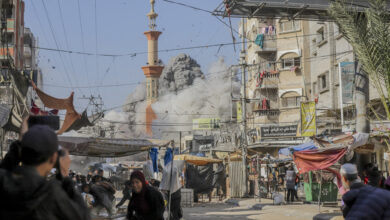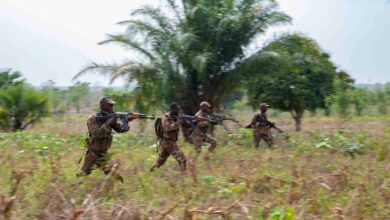Slow admissions of civilian harm in Somalia raise questions about US transparency
General Stephen Townsend drove openness in civilian casualty reporting in the war against ISIS in Iraq and Syria. Now he leads AFRICOM’s fight against al-Qaeda affiliate al-Shabaab, and rights groups want greater accountability.
Earlier this month, a Somali journalist approached a representative of U.S. Africa Command during a media event in Mogadishu to say that an American drone strike had just killed his young niece in the town of Jilib, some 300 km away, in territory controlled by al-Shabaab militants.
“I explained everything that happened,” Abdi told The Defense Post two days after the strike.
The AFRICOM representative did not ask for Abdi’s contact information, or provide his own, the journalist told The Defense Post. He only offered condolences before dismissing himself from the conversation.
Later that day, the command, which is based in Stuttgart, Germany, said no civilians had been killed in the strike.
“We continue to assess the allegation. As such we are unable to share additional information at this time,” U.S. Air Force Major Karl Wiest, an AFRICOM spokesperson, told The Defense Post via email.
AFRICOM personnel are required by internal policy to “ensure” all civilian casualty allegations, “regardless of source, are treated as serious claims and reported and assessed,” according to a command instruction provided to The Defense Post.
Yet neither Abdi nor others who have attempted to report the deaths of their loved ones in U.S. airstrikes have been contacted by the command.
The pattern raises questions about AFRICOM’s implementation of its own civilian casualties policy at a time when the Defense Department is working to implement uniform standards across the U.S. military.
In AFRICOM’s 13-year history, it has admitted to a single incident of two civilian deaths across the entire continent, despite more than 150 airstrikes in Somalia alone.
That differs starkly from the much larger U.S. missions in Iraq and Afghanistan, in which the U.S. military has been open to pathways for civilians to report claims of relatives’ deaths and seek compensation.
Unlike in other missions, the AFRICOM team responsible for investigating reports of civilian casualties is made up of people who are involved in planning strikes, causing sources directly familiar with the matter to raise concerns of institutional bias.
“If you are an average Somali and your cousin is killed in an airstrike, you have no way to call the U.S. government and say so,” said Brian Castner, a senior advisor at Amnesty and former explosive ordnance disposal officer in the U.S. Air Force.
“Everyone agrees that this should be a really obvious thing that AFRICOM should be able to do,” Castner, who has sat in repeated meetings with the command, told The Defense Post.
Policy and practice diverge across US commands
On paper, AFRICOM’s civilian casualty policy is similar to those of other U.S. combatant commands.
“USAFRICOM practice is to review and assess every report that its forces may have caused civilian casualties,” according to a 2019 Defense Department civilian casualty policy report.
As in other U.S. missions around the globe, it is up to a working group appointed by a commander to determine “whether it is more likely than not that civilians were killed or injured, or if additional information is required.”
AFRICOM has not publicly announced civilian casualties caused by Somali and Kenyan troops on missions alongside U.S. Special Operations Forces, even when it deemed such incidents “credible,” according to documents first reported by The Intercept and obtained by The Defense Post.
That has frustrated human rights researchers, who have regularly met with the command and have encouraged American officials to reform AFRICOM’s practices.
“It’s not just AFRICOM – at the Pentagon, they push back on us all the time when we push for more transparency on civilian casualties caused during partnered operations,” a senior human rights researcher told The Defense Post.
The researcher called it “disingenuous” for AFRICOM not to announce civilian casualties that occur during joint operations with local ground forces.
The military, says those releases are the responsibility of Somalia’s government, he said.
“Public release of [civilian casualty] information involving partner forces will be closely coordinated with the appropriate country team and Chief of Mission,” at the relevant U.S. embassy, according to the AFRICOM instruction. It’s unclear what agreement, if any, the State Department and Somalia have about acknowledging civilian casualties.
“AFRICOM realizes that its job is mostly political,” the first researcher said. “And it doesn’t like being questioned about not having a perfect record.”
According to data from the U.K.-based Bureau of Investigative Journalism, U.S. drone strikes in Somalia from January 2004 and February 2020 may have killed between 10 and 58 civilians.

Previous statements by AFRICOM have raised questions as to whether it too readily classifies so-called military-age males in Shabaab-controlled territory as “members or affiliates” of the al-Qaeda-affiliated Islamist militant group, and thus as legitimate targets – a practice Amnesty International has labeled a possible war crime.
“Even when you present credible evidence, they still will tell you, we assess the individuals killed were terrorists,” said Abdullahi Hassan, Amnesty’s lead Somalia researcher.
More than 26,000 people, including 3,300 civilians, were reported killed by al-Shabaab in Somalia between February 2012 – when the group first pledged allegiance to al-Qaeda – and January of this year, according to data collated by ACLED. And collecting evidence of U.S. drone strikes in rural Somalia is notoriously difficult, because U.S. and Somali troops rarely travel to strike locations in territory held by al-Shabaab, and because the group doles out harsh punishments for possession of smartphones.
When photo or video evidence does emerge, it is often posted on pro-Shabaab websites.
While the militant group sometimes exaggerates claims, Amnesty researchers have deemed some civilian casualty claims posted on Shabaab websites to be “credible.”
Those assessments are based on geolocation of images, as well as interviews, weapons analysis and reviews of strike data released by AFRICOM, according to Castner.
Yet AFRICOM has dismissed some claims on the basis that Shabaab published the evidence, Castner said. “AFRICOM has said well, we don’t trust Somali Memo[.net], it’s an al-Shabaab website.”
“That doesn’t mean that all the photos are wrong.”
“The U.S. cannot say, ‘These are not civilians, just because they were posted by al-Shabaab,” Hassan told The Defense Post. “AFRICOM still needs to investigate … who those individuals were and how they were killed.”
Neither the Middle East-focused U.S. Central Command nor AFRICOM require officers to reach out to “external sources” for further information on claims.
According to a recent report by The Center for Civilians in Conflict, a Washington, D.C.-based NGO, AFRICOM deemed 37 claims of airstrike civilian casualties in Somalia and Libya “credible” between 2016 and 2019, but did not interview any witnesses or dispatch personnel to any target location.
Retired U.S. Air Force Colonel John Dorrian said AFRICOM faces an uphill task investigating civilian casualties as the locations are out of reach for U.S. or Somali government ground troops, let alone civilian teams.
Dorrian, a former spokesperson for the CENTCOM-led Combined Joint Task Force – Operation Inherent Resolve and previously chief of press desk operations for the International Security Assistance Force in Afghanistan, told The Defense Post that U.S. headquarters in Iraq and Afghanistan often judged civilian casualty reports as “credible” just based on flight data and aerial surveillance in the absence of troops on the ground.
Like in other areas of U.S. military operation, AFRICOM is known to loiter drones for hours after a strike.
According to unclassified documents provided to The Defense Post, at least one civilian casualty report was deemed “not credible” in part because a review of the strike video did not reveal evidence that civilians were harmed.
It has been reported that civilians sometimes do not venture out of their homes following a drone strike, in fear they may be targeted too. As Abdi tells it, neighbors and relatives waited a full day to go outside and bury his niece until a lingering drone flew away.
“We were always very careful to not make declarative statements about things that we weren’t sure of,” Dorrian said of his experience in Afghanistan, Iraq and Syria. “We did not try to portray our civilian casualty reporting as comprehensive.”
In Iraq and Syria, the U.S.-led international Coalition against Islamic State came under intense scrutiny for its air campaign and formed an independent civilian casualty assessment team from diverse backgrounds, including pilots and imagery specialists, but also civil affairs advisors and lawyers.
CJTF-OIR has declared more than 34,000 strikes since 2014 and claims responsibility for more than 1,340 civilian deaths in Iraq and Syria, although rights groups and media investigations have estimated the death tolls are far higher.
New AFRICOM commander Townsend offers model for increased openness
When he was commander of CJTF-OIR, Army General Stephen Townsend was critical of NGOs like Airwars for scrutinizing U.S. strikes and not those by Russia, which has systematically targeted civilians in Syria.
And though he did not initiate the policy, a source familiar with the matter said that “Townsend did a pretty decent job of trying to put in some firewalls between the process of assessing and those who were actually involved in strikes.”
A U.S. military source familiar with Coalition operations against ISIS in Iraq and Syria said Townsend took a front seat in making sure CJTF-OIR’s civilian casualty reporting was open and transparent.
The U.S. has also paid compensation to families of civilians it has killed in both Iraq and Afghanistan for years.
Townsend, who now heads AFRICOM, has not yet instituted such policies in his new command.

“The people who are involved in the planning [of strikes in Somalia] – the intel, the operations – they’re the same ones who are looking at the allegations,” the source familiar with the AFRICOM assessments said on the condition of anonymity because they were not authorized to speak publicly on the matter.
Wiest, the AFRICOM spokesperson, pushed back on that characterization. “Our process contains safeguards to ensure unbiased and independent assessments.”
“Assessments are conducted across the staff at the AFRICOM and subordinate command levels, and all completed assessments are reviewed and approved by a general officer,” Wiest said.
NGOs working with the Pentagon to reform civilian casualty policies have urged commands to bring in independent oversight, which may avoid internal pressures not to self-report civilian incidents.
In Iraq and Syria, which saw far more airstrikes at the height of the battles against ISIS, the Coalition regularly self-reported possible civilian harm from airstrikes, which is clear from a glance at public CJTF-OIR monthly casualty assessments.
Self-reports would come from pilots or even loitering drones in the area that were watching for battle damage assessment, the military source said.
“We don’t just shoot the munition and fly away. We spend a lot of time developing these targets – we want to make sure before we strike the conditions are appropriate to strike and then … they will normally stay and loiter and watch whether or not the strike was successful.”
Castner, of Amnesty International, said AFRICOM should “have someone impartial.”
“It shouldn’t be hard for AFRICOM to pull someone in from Washington.”
It’s not clear whether the command has the resources to compile such teams, and it is now under further pressure as Defense Secretary Mark Esper considers possible cuts to U.S. personnel numbers and equipment across Africa.
Ultimately, the proof of the problem is in the strike reports, experts say.
“You can’t learn from the mistakes if you can’t admit the mistakes,” said Chris Woods, founder of Airwars, an NGO which has conducted extensive documentation of air and artillery strikes in Syria and Iraq and worked with the U.S. military to improve its policies.
“We’re not there yet with AFRICOM,” Woods said.
There are inconsistencies in the command’s reporting of strikes in Somalia, he said. Sometimes the Somali government will announce a U.S. strike, but AFRICOM will not. In other cases, neither will announce one, but local reports indicate a strike occurred – suggesting that the CIA might be to blame for some of the unclaimed incidents.
But the command’s willingness to work with NGOs on civilian casualties policy is a promising sign, Woods said.
“Militaries have been too reliant on their own internal assessments, and not paying enough attention to what local communities are telling them,” Woods told The Defense Post.
The U.S. military mission in Somalia still lags behind other operations, Woods said. “It took AFRICOM twelve years of bombing in Somalia to admit its first civilian casualties.”
Some barriers remain for families to report civilian casualties
Journalist Amanda Sperber has reported a number of civilian casualty claims and offered to provide relatives’ contact information to AFRICOM. She says for a long time, the command refused.
In April 2019, AFRICOM admitted to killing two civilians in a strike one year earlier. The inquiry was made “due to a recent increase in airstrikes and continued interest by Amnesty International and Congress on civilian casualties,” AFRICOM said at the time.
After the strike this month, the command accepted contact information for Ibrahim’s cousin, Ahmed. But they never called.
“We are ready to submit proof that Ibrahim did involve [himself with] any terrorists, any al-Shabaab,” Ahmed told The Defense Post.
A researcher directly familiar with the handling of Hiray’s claim said that AFRICOM has insisted that claimants must initiate contact – even though there is no hotline or physical office for people to do so.
AFRICOM recently added a link on its website for the public to contact it regarding civilian casualty allegations, Wiest told The Defense Post on Monday.

As of Monday, the option to contact AFRICOM with a civilian casualty claim could be found, in English, in a dropdown menu on the Contact Us page on the command’s website. The command is not known to have contacted a single relative to hear their stories, several sources told The Defense Post.
“Several factors that I am unable to discuss ultimately led to a decision to not contact the family member,” Wiest said.
But people living in Shabaab territory generally do not have access to the internet, experts say.
“They can however get to Mogadishu,” said Castner.
AFRICOM has resisted suggestions from NGOs to open an office where Somalis can report civilian deaths, he explained.
Pentagon officials have told rights groups like Amnesty that’s not possible, he said.
“Sometimes they say, ‘Just imagine the amount of disinformation we’d get, and how would we sort out what’s true?’”
The command has also said an office could be a target for Shabaab attacks.
“They don’t have to do this at the U.S. embassy at the airport,” Castner said. “The Somali government has offices, there are ways to do this.”
“If people like [Hiray and Abdi] can’t get ahold of AFRICOM, nobody can.”
“There’s a strong cultural resistance [in AFRICOM] against” contacting victims’ family members, the second researcher said. “I think they just don’t want to.”
“They’ll tell you every time that they had iron-clad intel that they knew who they killed.”
Despite frustrations, Woods says the command is open to intra-military review. AFRICOM is preparing to adopt a new, U.S.-military-wide civilian casualty assessment and reporting policy later this year.
The reform – initiated under former Defense Secretary James Mattis and then mandated by Congress in 2019 – aims to adopt the best civilian casualty assessment practices from various commands and apply them across the entire U.S. military, superseding the mismatched procedures carried out at the discretion of teams designated by local commanders.
In the meantime, Somali families will await answers.
“When civilian casualties happen, people need an apology, sorry, or at least a conversation,” Abdi told The Defense Post.
“If civilian casualties are ignored,” he said, “it will only help the militants, because they take it as propaganda.”
Joanne Stocker contributed reporting.












